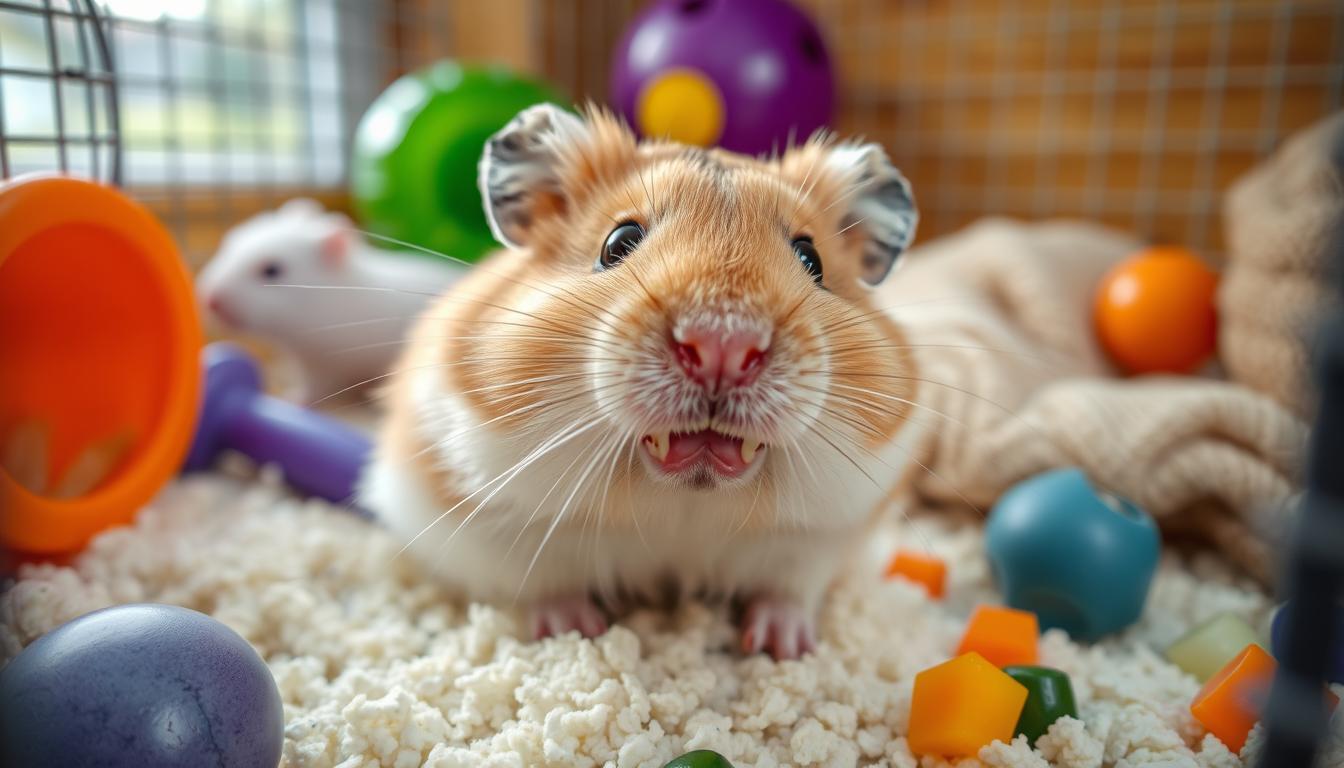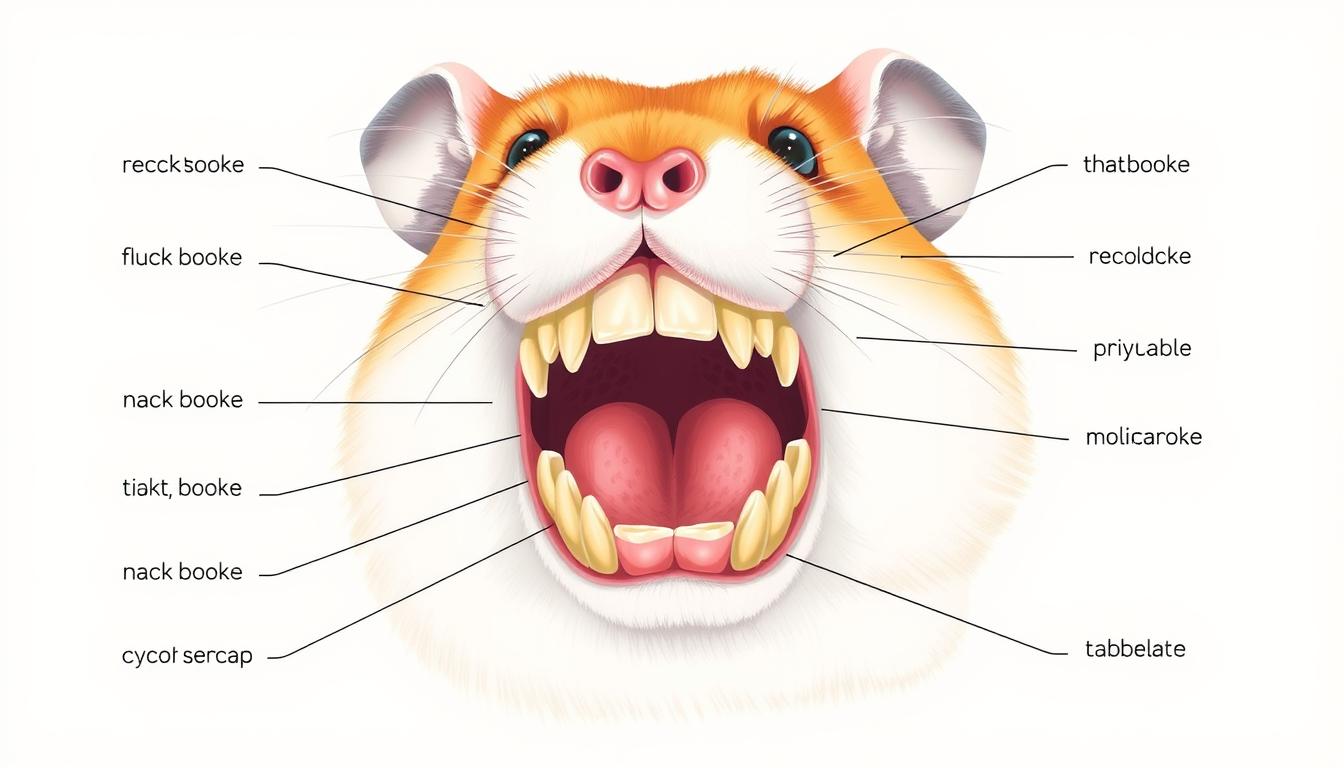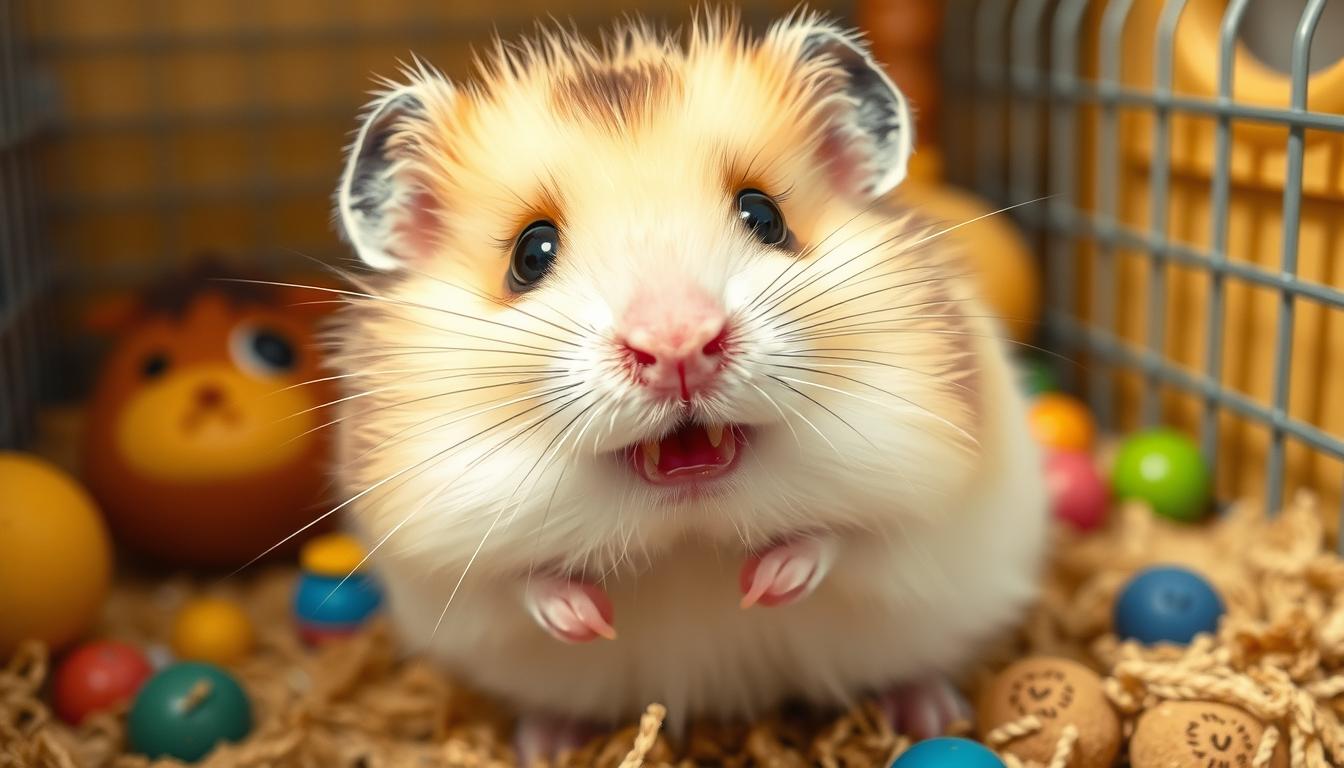Do you know that your furry friend’s teeth never stop growing? As a devoted hamster owner, it’s crucial to understand the importance of maintaining their dental health. But what if your hamster’s teeth become too long? Are you prepared to address this common, yet potentially serious, issue? In this comprehensive guide, we’ll explore the signs, causes, and solutions for helping your hamster with overgrown teeth.
Key Takeaways
- Hamsters’ teeth continuously grow throughout their lifetime, requiring regular dental care.
- Overgrown teeth can lead to eating difficulties, health issues, and even life-threatening complications if left untreated.
- Recognizing the signs of dental problems, such as behavioral changes and physical symptoms, is crucial for early intervention.
- Proper diet, chew toys, and regular vet check-ups are essential for maintaining your hamster’s dental health.
- Home remedies and professional treatments may be necessary to address severe cases of overgrown teeth.
Understanding Hamster Teeth and Their Growth
Hamsters have unique teeth that grow continuously. This is important for them to keep their teeth sharp for chewing. It helps them grind their food effectively.
The Anatomy of a Hamster’s Teeth
Hamsters have 16 teeth, with 4 sharp incisors and 12 molars. The incisors are key for gnawing and cutting. They are hard and shaped like chisels, perfect for their natural behaviors.
Why Do Hamsters’ Teeth Keep Growing?
Hamsters’ teeth grow continuously to keep them healthy. As they chew, their teeth wear down. So, they grow back to stay sharp and functional.
Common Dental Problems in Hamsters
Hamsters can face dental issues like malocclusion and overgrown incisors. Malocclusion means their teeth don’t line up right, causing chewing problems. Overgrown incisors can be painful and lead to serious health issues.
“Maintaining healthy teeth is crucial for a hamster’s overall well-being, as dental problems can significantly impact their quality of life.”
Signs Your Hamster May Have Overgrown Teeth
Keeping an eye on your hamster’s Hamster Dental Health is key to avoiding dental problems. Watch for changes in behavior and physical signs to spot Overgrown Incisors early. This way, you can get your hamster the care they need quickly.
Behavioral Changes to Watch For
One early sign of dental trouble in hamsters is a change in eating habits. If your hamster is not eager to chew or won’t eat their favorite Small Pet Grooming foods, it might be in pain. This is because of overgrown teeth.
Also, look out for too much drooling or a lack of self-grooming. These could be signs of dental problems. Watch your hamster’s activity and energy levels too. A drop in these could mean trouble.
Physical Symptoms of Dental Issues
Checking your hamster’s mouth can reveal dental issues. Look for swelling, redness, or color changes around the teeth and gums. If you see anything odd, a vet should check your pet.
Weight loss is another sign of dental trouble in hamsters. They might not be able to chew and eat well, leading to less appetite and weight loss.
When to Consult a Veterinarian
If you see any behavioral or physical changes in your hamster, see a vet. A vet who knows about small animals is best. Early action is important to keep your hamster’s Hamster Dental Health good.
Acting fast on dental issues can greatly improve your hamster’s life and health.
The Importance of Dental Care for Hamsters
Keeping your hamster’s teeth clean is key to their health. Hamsters need Rodent Dental Care to avoid big problems. These issues can harm their diet, nutrition, and happiness.
Maintaining Overall Health through Dental Hygiene
Hamster Dental Health is more than just clean teeth. It’s a big part of Small Pet Grooming. It keeps them healthy and happy. Clean teeth and gums stop pain, infections, and diseases.
How Dental Issues Can Affect Their Diet
Hamsters with bad teeth can’t eat right. This leads to not getting enough nutrients. It can cause weight loss and health problems. Fixing dental issues early helps them eat well.
By focusing on dental care, you help your hamster stay healthy. Regular dental checks, good hygiene, and the right food make them happy and healthy.
Nutrition and Its Role in Dental Health
Keeping Hamster Teeth healthy is all about the right food. Hamsters have teeth that grow forever, needing constant care. A good diet keeps their teeth sharp and prevents dental problems.
Best Foods for Maintaining Healthy Teeth
For your hamster’s dental health, choose foods that are crunchy and fibrous. Here are some top picks:
- Timothy hay, which helps wear down their Gnawing Habits
- Whole grain cereals and breads, which provide the necessary abrasion
- Fresh vegetables like carrots and leafy greens
- Unsweetened nuts and seeds
Avoiding Soft Foods: What to Know
Soft, mushy foods might look appealing, but they’re not good. Hamsters’ teeth need to grind and wear down constantly. Soft foods don’t offer enough abrasion, leading to dental issues.
| Food Type | Impact on Dental Health |
|---|---|
| Crunchy, Fibrous Foods | Helps maintain proper tooth wear and growth |
| Soft, Mushy Foods | Can contribute to overgrown teeth and dental issues |
Choose the right Hamster Teeth-friendly foods and avoid soft ones. This ensures your hamster has healthy teeth and a natural Rodent Dental Care routine.
Safe Chewing Options for Your Hamster
Keeping your hamster’s teeth healthy is very important. They need to chew often to keep their teeth from getting too long. Here are some good chew toys and DIY ideas to help your hamster stay healthy.
Recommended Chew Toys and Materials
There are many safe chew toys for hamsters. Look for ones made from natural wood, like untreated branches. You can also use pet-safe cardboard and paper.
- Natural wood blocks or branches
- Cardboard tubes or boxes
- Wooden chew toys designed for small pets
- Untreated, non-toxic wicker or grass-based items
DIY Chew Toys: Fun and Functional Ideas
Make your own chew toys for your hamster. These toys help keep their teeth healthy and keep them busy. Try making a chew stick with cheerios or dried apple slices on a stick. Or, make a chewable structure with hay, straw, or paper strips.
| DIY Chew Toy Idea | Materials Needed |
|---|---|
| Cheerio Chew Stick | Untreated wooden stick, Cheerios |
| Woven Hay Hideout | Hay, straw, paper strips |
| Cardboard Chewing Maze | Cardboard boxes, tubes |
Offering different chew toys keeps your hamster’s teeth healthy. It also keeps them happy. Remember, taking care of their teeth is key to their happiness and health.
Regular Dental Check-ups for Hamsters
Keeping your hamster’s Hamster Dental Health in top shape is key to their happiness. It’s important to take them to the vet regularly. This helps keep their teeth healthy and catches any Rodent Dental Care problems early.
When to Schedule Vet Visits
Take your hamster to the vet once a year for a dental check. Choose a vet who knows about Malocclusion in Hamsters. They can check your hamster’s teeth, find any issues, and fix them.
What to Expect During a Dental Examination
The vet will look closely at your hamster’s mouth during the exam. They’ll check for overgrown teeth, abscesses, and other dental problems. They might trim or file teeth that are too long or sharp.
The vet will also give advice on diet, chew toys, and dental care. This helps prevent future dental issues.
| Dental Concern | Possible Causes | Recommended Treatment |
|---|---|---|
| Overgrown Teeth | Improper diet, lack of chewing | Tooth trimming, dietary adjustments |
| Cheek Pouch Abscesses | Dental injuries, foreign object impaction | Abscess drainage, antibiotic treatment |
| Tooth Root Issues | Injury, infection, genetic factors | Tooth extraction, antibiotics |
Regular Hamster Dental Health check-ups are vital for any hamster owner. By teaming up with your vet, you can keep your hamster’s smile healthy and bright for a long time.
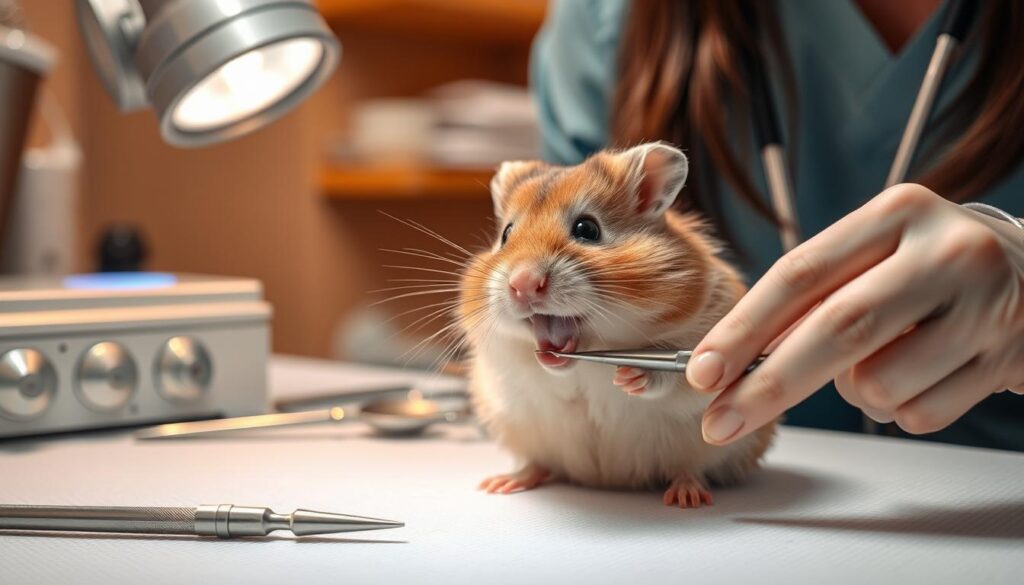
Home Remedies for Overgrown Teeth
As a hamster owner, keeping their teeth healthy is key. Regular vet visits are important, but you can also try home remedies for overgrown incisors. Understanding your hamster’s gnawing habits and using the right chew toys can help.
Easy Techniques to Promote Natural Wear
One easy way to help with hamster tooth trimming is to give them chew toys. Wooden blocks, cardboard tubes, and untreated tree branches are great. They let your hamster gnaw and grind down their teeth.
Changing these items often keeps your hamster interested and helps their teeth stay healthy.
Foods That Help Grind Down Teeth
- Hay: High-fiber hay, such as timothy or orchard grass, is an essential part of a hamster’s diet and helps wear down their teeth through constant chewing.
- Celery sticks: The crunchy texture of celery can act as a natural file, helping to keep your hamster’s teeth in good condition.
- Hard treats: Look for specially formulated hamster treats that are designed to promote dental health through abrasive chewing.
Adding these home remedies to your hamster’s daily life can help their dental health. This might prevent the need for more serious Hamster Tooth Trimming procedures. Always watch your pet and talk to your vet if you have any dental health worries.
Professional Treatments for Severe Cases
If your hamster’s teeth are too long, it’s time to get help. Tooth Trimming and other dental care might be needed. This is to fix Malocclusion in Hamsters and keep their teeth healthy.
Dental Procedures Hamsters May Need
For serious Rodent Dental Care problems, your vet might suggest these treatments:
- Tooth trimming: Your vet will cut the teeth to a good size, making sure they work right.
- Tooth extraction: If a tooth is too damaged or hurts a lot, it might need to be removed.
- Filing or grinding: Your vet might smooth out uneven teeth to help your hamster chew better.
Aftercare Following Dental Treatment
After dental care, it’s important to follow your vet’s advice. This includes:
- Giving any medicine to help with pain or prevent infection.
- Feeding soft food to help your hamster heal.
- Watching how your hamster eats and grooms to make sure they’re okay.
- Going back to the vet for check-ups to make sure everything is healing right.
Keeping up with dental care is vital for your hamster’s health. Working with your vet will help your hamster live a happy, healthy life.
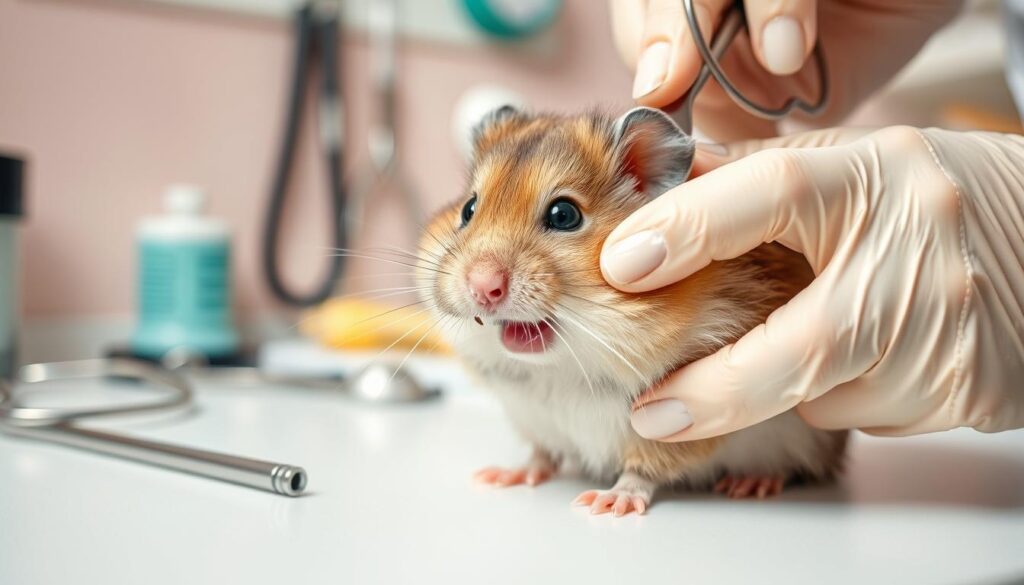
Preventing Overgrown Teeth in the Future
Keeping your hamster’s teeth healthy is a big job, but it’s doable. With the right steps, you can stop overgrown teeth before they start. Start a dental care routine and adjust their diet to keep their teeth in top shape. This will help your small pet stay healthy for a long time. Learn more about hamster dental health here.
Establishing a Routine for Dental Health
Preventing Hamster Dental Health problems starts with a regular dental care routine. This includes:
- Regularly checking your hamster’s teeth for any signs of overgrowth or other issues.
- Providing a variety of Small Pet Grooming approved chew toys to help keep their teeth naturally worn down.
- Incorporating tooth-friendly foods into their diet, such as crunchy vegetables and hay.
Nutritional Adjustments for Long-term Care
Along with a dental care routine, changing your hamster’s diet can also help. Think about:
- Incorporating more fibrous, crunchy foods that require active Gnawing Habits to chew.
- Limiting the amount of soft, sticky, or sugary treats that can contribute to plaque buildup.
- Providing a balanced, nutrient-rich diet that supports overall health and wellness.
By combining a consistent dental care routine with a well-rounded, Hamster Dental Health-focused diet, you can help prevent future issues with overgrown teeth. This will keep your furry friend happy and healthy for years to come.
“Proactive dental care is the key to a hamster’s long-term health and wellbeing.”
Additional Resources for Hamster Owners
Starting your journey in caring for your hamster’s dental health? You might want to check out more resources. Online communities and books can help you learn more about hamster care and nutrition.
Online Communities and Support Groups
Connecting with other hamster owners is very helpful. Look for online forums, Facebook groups, or subreddits for hamster fans. Here, you can share tips, ask questions, and learn from others. These places are full of info on Hamster Teeth, Rodent Dental Care, and Small Pet Grooming.
Books and Guides on Hamster Care
While the internet is full of info, sometimes a good book is better. Get books or e-books from experts or vets. They offer detailed advice on hamster care, including dental health and overall well-being.

